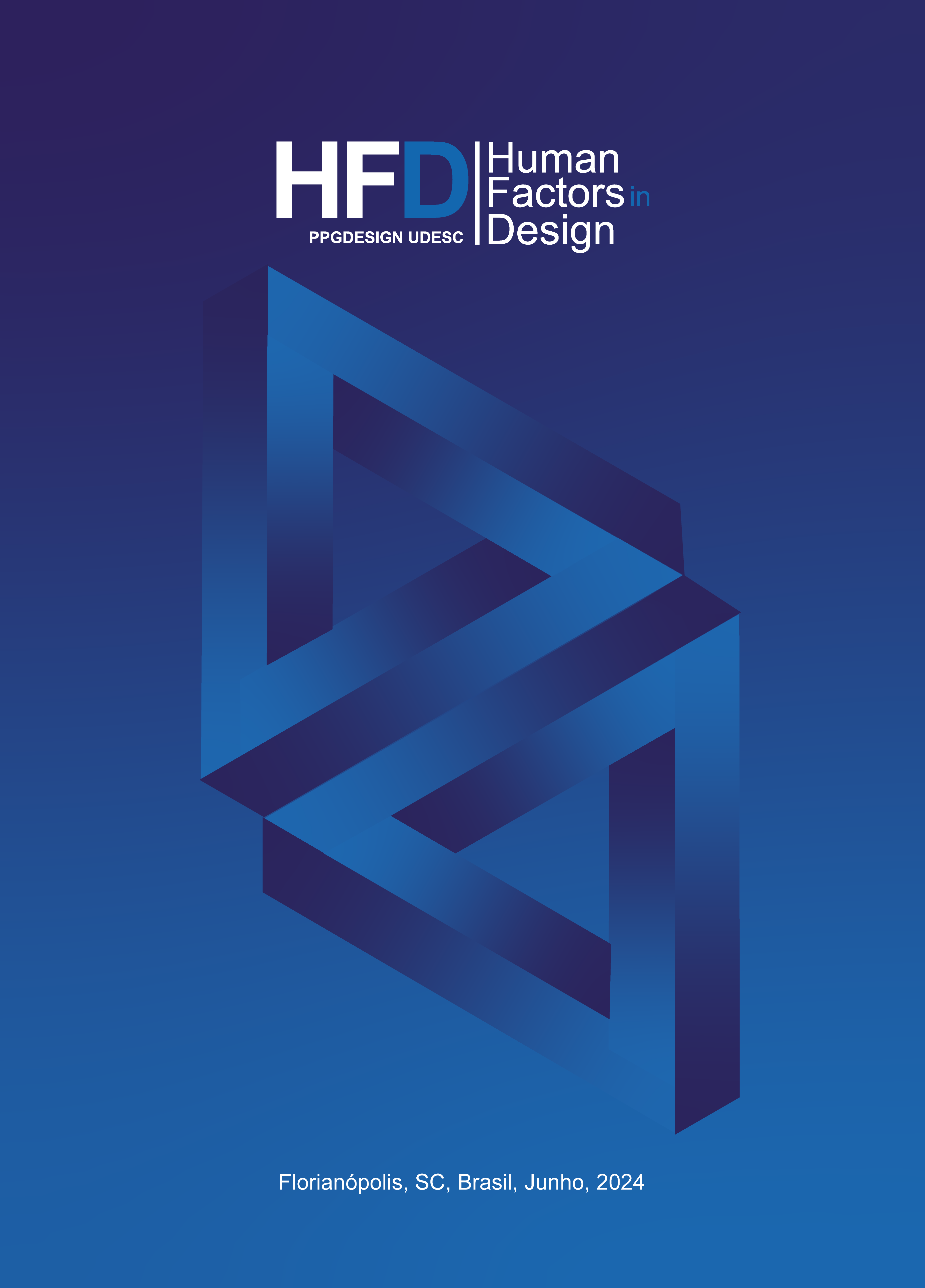Avaliação de experiência de uma carteira digital usando um método baseado em Autoconceito
DOI:
https://doi.org/10.5965/2316796313252024076Palavras-chave:
experiência do usuário, UX/UI, Autoconceito, designResumo
O método do Autoconceito tem a característica inovadora de medir a distância entre as expectativas ideais e reais, ao invés de considerar a nota absoluta recebida por um artefato. Nesta pesquisa, utilizamos um método baseado no Autoconceito para avaliar a experiência do usuário de uma carteira digital. Portanto, três protótipos do mesmo aplicativo de carteira digital foram avaliados usando a Escala de Usabilidade do Sistema (SUS) e a metodologia baseada no autoconceito. A partir disso, foi possível definir sentimentos/percepções que qualificam a experiência com carteiras digitais e ainda avaliar sucessivas versões de protótipos. O conceito foi considerado menos distante da idealização dos participantes do teste, e gerou insights a partir das experiências dos usuários.
Downloads
Referências
DIALLO, M. F., & COLLIN-LACHAUD, I. Impact of hedonic evaluation of technological innovations on revisit intention in a store digitalization context. International Journal of Technology and Human Interaction (IJTHI), 15(4), 38-53, 2019. DOI: https://doi.org/10.4018/IJTHI.2019100104
GRUBB, Edward L.; GRATHWOHL, Harrison L. Consumer self-concept, symbolism and market behavior: A theoretical approach. Journal of Marketing, v. 31, n. 4, p. 22-27, 1967. DOI: https://doi.org/10.1177/002224296703100405
IKRAM, M., KHAN, S. S., & JEONG, B. K. An Empirical Investigation of Smartphone Adoption in Pakistan. In Multigenerational Online Behavior and Media Use: Concepts, Methodologies, Tools, and Applications (pp. 1097-1118). IGI Global, 2019. DOI: https://doi.org/10.4018/978-1-5225-7909-0.ch060
SIRGY, M. Joseph. Self-concept in consumer behavior: A critical review. Journal of consumer research, v. 9, n. 3, p. 287-300, 1982. DOI: https://doi.org/10.1086/208924
MAINWARING, S. D., ANDERSON, K., & CHANG, M. F. What's in your wallet? Implications for global e-wallet design. In CHI'05 Extended Abstracts on Human Factors in Computing Systems (pp. 1613-1616), 2005. DOI: https://doi.org/10.1145/1056808.1056979
MENDES, Lucas. Investigações sobre as influências da presença espacial na experiência do usuário em artefatos de realidade virtual. Departamento de Design, Universidade Federal de Pernambuco (UFPE), 2020.
NEVES, M. A. Caracterização do Usuário através de uma Perspectiva do Comportamento do Consumidor. Departamento de Design, Universidade Federal de Pernambuco (UFPE), 2016
ROSENBERG, M. Conceiving the Self. Publisher, Basic Books, 1979.
ZHOU, T. An empirical examination of users' switch from online payment to mobile payment. International Journal of Technology and Human Interaction (IJTHI), 11(1), 55-66, 2015. DOI: https://doi.org/10.4018/ijthi.2015010104
WANIA, C. E., ATWOOD, M. E., & MCCAIN, K. W. How do Design and evaluation interrelate in HCI research?. In Proceedings of the 6th conference on Designing Interactive Systems (pp. 90-98), 2006. DOI: https://doi.org/10.1145/1142405.1142421
TENG, S., & KHONG, K. W. Examining actual consumer usage of E-wallet: A case study of big data analytics. Computers in Human Behavior, 121, 106778, 2021. DOI: https://doi.org/10.1016/j.chb.2021.106778
WALLACE, E., BUIL, I., CHERNATONY, L. "Consumers’ self-congruence with a “Liked” brand: Cognitive network influence and brand outcomes", European Journal of Marketing, Vol. 51 Issue: 2, pp.367-390, https://doi.org/10.1108/EJM-07-2015-0442, 2017. DOI: https://doi.org/10.1108/EJM-07-2015-0442
HANINGTON, Bruce; MARTIN, Bella. Universal Methods of Design: 100 Ways to Research Complex Problems, Develop Innovative Ideas, and Design Effective Solutions. Everley, MA, USA: Rockport, 2012.
CAPPELLARI, Gabriela; COSTA, Rafaela; ZAMBERLAN, Luciano; SPAREMBERGER, Ariosto; SAUSEN, JO. Self-concept, lifestyle, and consumption of feminine fashion clothing. Journal of Business and Administration of the Amazon, V.9, n.2, Special, 2017. DOI: https://doi.org/10.18361/2176-8366/rara.v9n2p19-32
JAMAL, A. & Goode, M.. Consumers and brands: A study of the impact of self-image congruence on brand preference and satisfaction. Marketing Intelligence & Planning, 19(4), 482-492, 2001. DOI: https://doi.org/10.1108/02634500110408286
ROE, David; BRUWER, Johan. Self-concept, product involvement, and consumption occasions: Exploring fine wine consumer behavior. British Food Journal, Vol. 119 Issue: 6, pp. 1362, 2017. DOI: https://doi.org/10.1108/BFJ-10-2016-0476
TOTH, M. The role of Self-concept in consumer behavior. UNLV Theses/Dissertations/Professional Papers/Capstones. Paper, 2161, 2014.
VASQUEZ, M. M. et al. Intuitividade de um produto assistivo de uso doméstico e influência das affordances na percepção. Human Factors in Design, v. 5, n. 9, p. 003-017, 4 ago. 2016
MIRANDA, David; LI, Carmen; DARIN, Ticianne. Ues-br: Translation and cross-cultural adaptation of the user engagement scale for brazilian portuguese. Proceedings of the ACM on Human-Computer Interaction, v. 5, n. CHI PLAY, p. 1-22, 2021. DOI: https://doi.org/10.1145/3474705
Downloads
Publicado
Como Citar
Edição
Seção
Licença
Copyright (c) 2024 Human Factors in Design

Este trabalho está licenciado sob uma licença Creative Commons Attribution 4.0 International License.
Os artigos publicados pela revista são de uso gratuito, destinados a aplicações acadêmicas e não comerciais. Os direitos autorais são todos cedidos à revista. Os artigos cujos autores são identificados representam a expressão do ponto de vista de seus autores e não a posição oficial da revista Human Factors Design. O (s) autor (es) se compromete a sempre que publicar material referente ao artigo publicado na Revista Human Factors Design mencionar a referida publicação da seguinte forma:
Este artigo foi públicado originalmente pela Revista Human Factors Design em seu volume (colocar o volume), número (colocar o número) no ano de (colocar o ano) e pode ser acessado em: https://periodicos.udesc.br/index.php/hfd/index


